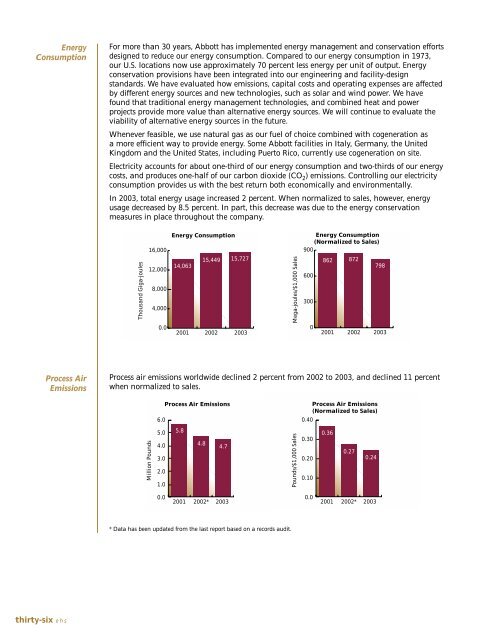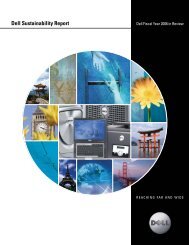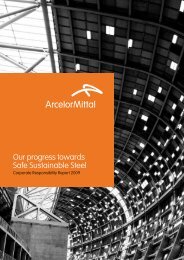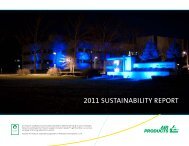Abbott 2003 Global Citizenship Report - Abbott Laboratories
Abbott 2003 Global Citizenship Report - Abbott Laboratories
Abbott 2003 Global Citizenship Report - Abbott Laboratories
You also want an ePaper? Increase the reach of your titles
YUMPU automatically turns print PDFs into web optimized ePapers that Google loves.
Energy<br />
Consumption<br />
For more than 30 years, <strong>Abbott</strong> has implemented energy management and conservation efforts<br />
designed to reduce our energy consumption. Compared to our energy consumption in 1973,<br />
our U.S. locations now use approximately 70 percent less energy per unit of output. Energy<br />
conservation provisions have been integrated into our engineering and facility-design<br />
standards. We have evaluated how emissions, capital costs and operating expenses are affected<br />
by different energy sources and new technologies, such as solar and wind power. We have<br />
found that traditional energy management technologies, and combined heat and power<br />
projects provide more value than alternative energy sources. We will continue to evaluate the<br />
viability of alternative energy sources in the future.<br />
Whenever feasible, we use natural gas as our fuel of choice combined with cogeneration as<br />
a more efficient way to provide energy. Some <strong>Abbott</strong> facilities in Italy, Germany, the United<br />
Kingdom and the United States, including Puerto Rico, currently use cogeneration on site.<br />
Electricity accounts for about one-third of our energy consumption and two-thirds of our energy<br />
costs, and produces one-half of our carbon dioxide (CO 2 ) emissions. Controlling our electricity<br />
consumption provides us with the best return both economically and environmentally.<br />
In <strong>2003</strong>, total energy usage increased 2 percent. When normalized to sales, however, energy<br />
usage decreased by 8.5 percent. In part, this decrease was due to the energy conservation<br />
measures in place throughout the company.<br />
Thousand Giga-joules<br />
16,000<br />
12,000<br />
8,000<br />
4,000<br />
0.0<br />
Energy Consumption<br />
15,449 15,727<br />
14,063<br />
2001 2002 <strong>2003</strong><br />
Mega-joules/$1,000 Sales<br />
Energy Consumption<br />
(Normalized to Sales)<br />
900<br />
862 872<br />
798<br />
600<br />
300<br />
0<br />
2001 2002 <strong>2003</strong><br />
Process Air<br />
Emissions<br />
Process air emissions worldwide declined 2 percent from 2002 to <strong>2003</strong>, and declined 11 percent<br />
when normalized to sales.<br />
Process Air Emissions<br />
6.0<br />
Process Air Emissions<br />
(Normalized to Sales)<br />
0.40<br />
Million Pounds<br />
5.0<br />
4.0<br />
3.0<br />
2.0<br />
1.0<br />
5.8<br />
4.8<br />
4.7<br />
Pounds/$1,000 Sales<br />
0.30<br />
0.20<br />
0.10<br />
0.36<br />
0.27<br />
0.24<br />
0.0<br />
2001<br />
2002* <strong>2003</strong><br />
0.0<br />
2001<br />
2002* <strong>2003</strong><br />
* Data has been updated from the last report based on a records audit.<br />
thirty-six ehs

















